https://www.youtube.com/watch?v=8yHsMeOmXkM
Riding Solo 25 - Q&A - Moto Gear Review
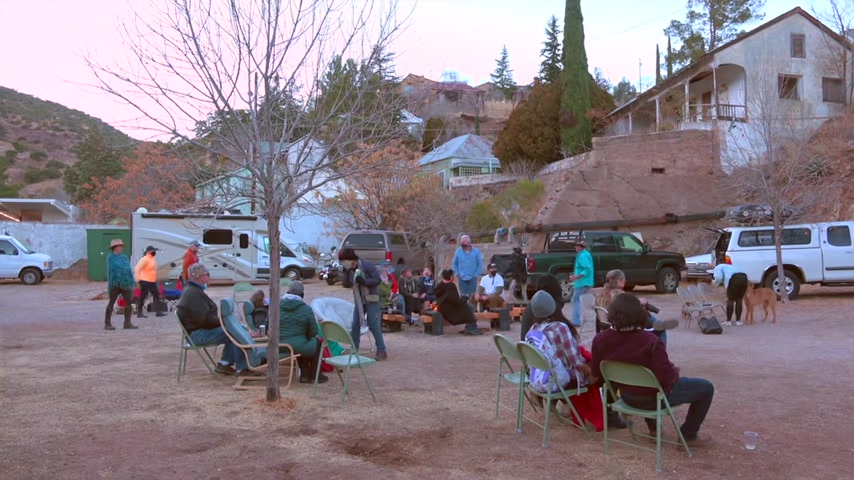
Hey guys , welcome back to my channel .
My name is Sterling .
And as most of you know , I just finished up a 6000 mile solo ride around the Western United States this summer .
And a lot of you have been following that series .
I really , really appreciate it .
I appreciate your comments and your enthusiasm and I know that you've had a lot of questions along the way .
And so in this video , I'm going to answer all of your questions about the gear that I used , how it performed and some of your other questions .
So that's what this video is all about right now .
I'm on the stage and this stage is pretty cool .
I must admit I built it myself last summer and it's in the backyard of my motel down here in Southern Arizona .
And we use it for music .
In fact , yesterday afternoon , we had a music concert out here in the backyard and it was pretty cool .
We do that whenever we can .
And if you come down here and visit us , maybe you'll happen to come across some live music .
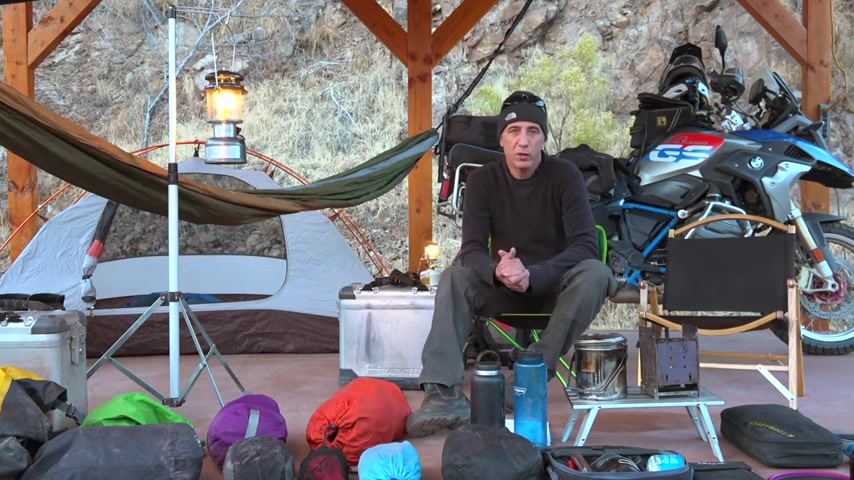
So that's where I'm at in the backstage here in Southern Arizona .
And I'm going to share with you some of my thoughts and answer some of your questions about the gear that I was using on this trip .
And then at the end , I'll tell you what I have in mind next for this channel .
So stick around and I might mention that I'm trying out an Amazon store .
So basically , it's a link that you can go to and all of my gear will be listed in one place .
And of course , I get a small commission from that .
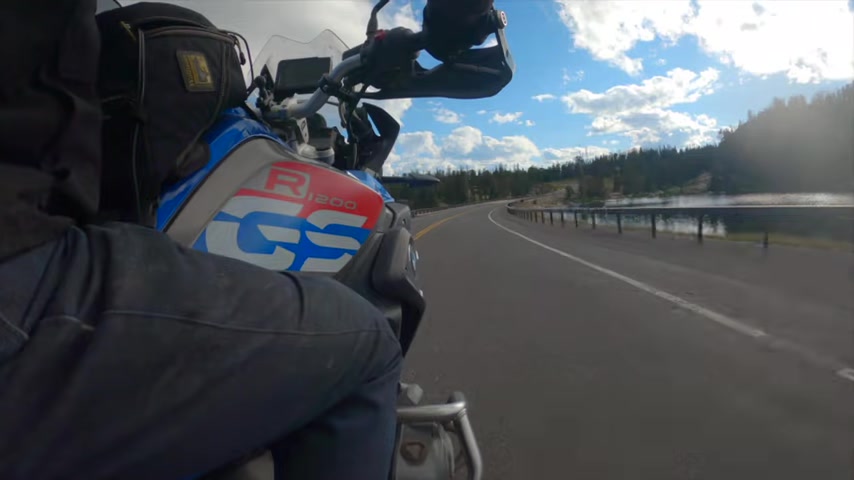
So if you guys want to help out the channel , if you purchase anything from that store , it helps me make more videos like this .
So I've had a few questions about the bike that I rode on this trip .
It's a BMW .
It's a 2017 R 1200 GS the rally edition .
And I'm not going to go into much detail about the bike in this video because I'm going to do a separate bike review video in the future .
But I will tell you that I did have one major , major problem with this bike on the trip and you didn't see any of that in the video .
And there's a reason for it , which you'll learn about when I do the bike review video .
So that's coming up .
So to answer some of your questions about the riding gear that I was wearing on this trip .
So the first piece of gear is my climb jacket .
And this particular model is the climb latitude jacket .
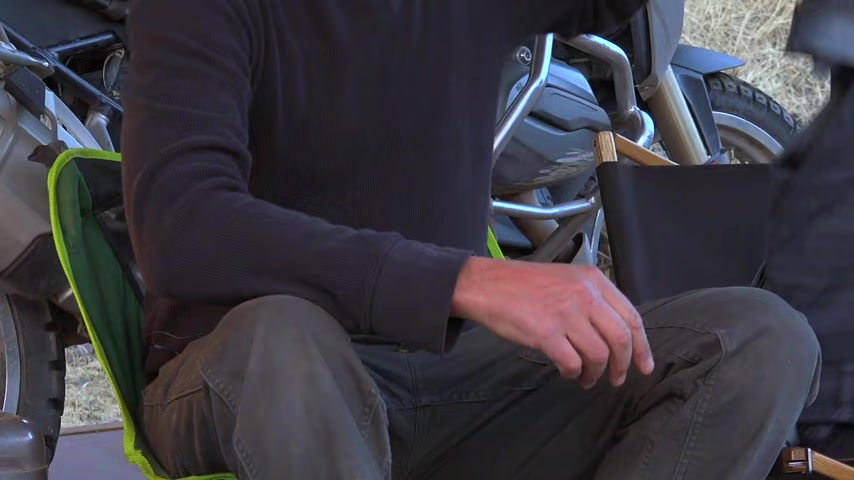
And as most of you know , it's climb makes some serious all weather motorcycle adventure gear .
It's fully waterproof .
It has the crash protection built in .
But this is what I wore on this trip .
A few of you asked about the pants that I wore on this trip .
I wore a pair of BMW denim jeans .
They have crash protection built into them .
They're not your typical adventure motorcycle gear like the pants that would go with the climb jacket .
And I will say too that I did bring some waterproof pants as well .
You have to have waterproof protection for all of your gear in case you do go through that kind of weather .
So I did have some rain pants that I put on over these times .
Not too much to say about my gloves .
They're just a simple pair of BMW , like a comfort sort of a summer glove .
They're ventilated , they're small , they're light , they have crash protection protection built into the knuckles here .
I've used these for five or six years .
I like them a lot .
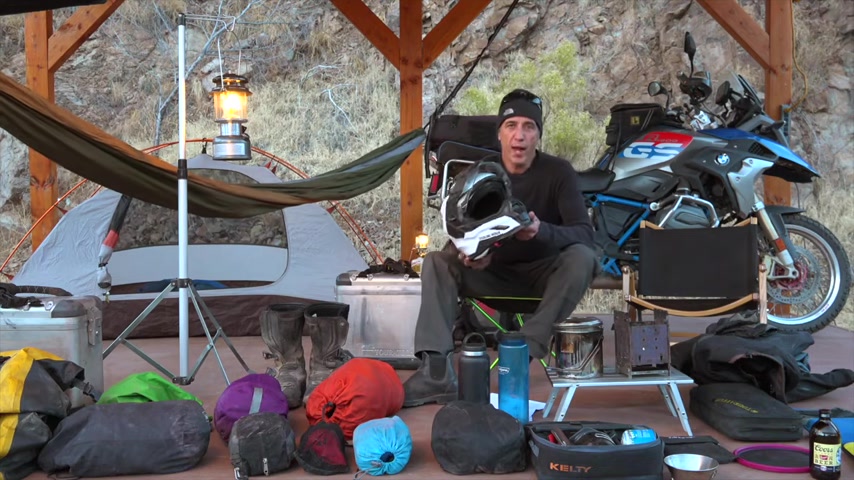
And the helmet that I rode with on this trip , it's by a Portuguese company and someone noticed that and pointed it out .
They're called N N E and I got this helmet in 2016 when I did a ride down in South America , it was called Expedition 65 .
And I filmed a whole series of videos on that ride and every team member got one of these helmets if you're interested in seeing that series about riding in South America , I'd be happy to post it .
I've never shared it on youtube before and it's really cool .
It was an epic 65 day tour of South America .
So let me know in the comments if you want to see that .
But this is the kind of helmet that I used on this trip .
I also have a modular shoeb helmet where it flips up and down .
I like that one a lot .
I ride with that a lot .
I like being able to just flip up my visor .
But the advantage of this helmet is that it's lighter and it has better air flow because I was riding in the heat of summer .
I chose to go with this helmet and I really didn't regret it at all .
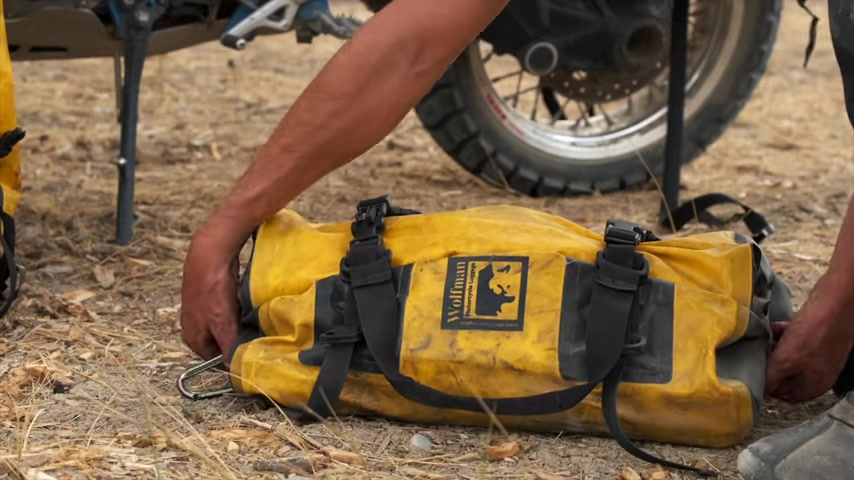
One thing I will point out about this helmet is that I have this mount right here and it's for my Go Pro and this is the best mount that I've ever found for a Go Pro camera .
The Go Pro just attaches right here and it has these really strong clamp jaws that go right there .
So just like that .
So this is the Django designs Gripper mount and I'll put a link for that down below .
So you can check it out .
Several people asked me about the dry bags that I was using on the trip to keep my gear totally dry along the way .
These are by a company called wolfman Luggage .
They're right here in the USA and Eric , the founder of wolfman is a good friend of mine .
He's been making this kind of equipment for over 25 years and he gave me this set of wolfman bags probably six years ago .
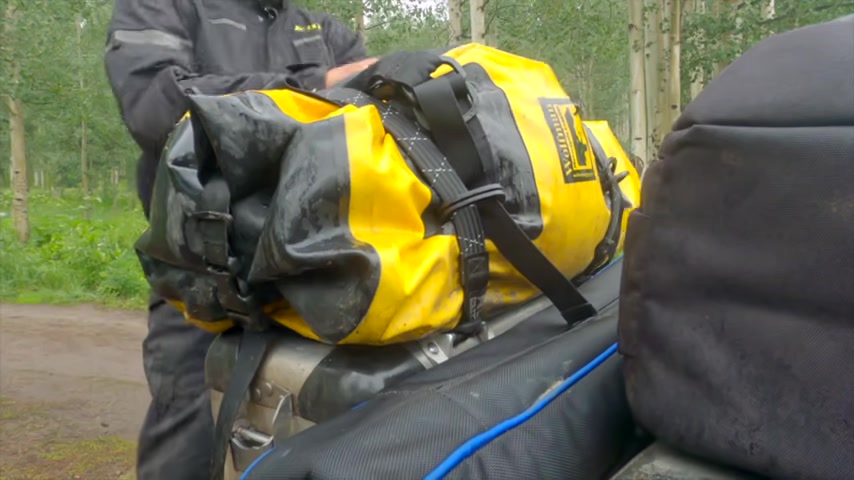
And I've ridden for thousands of miles in the back country with these bags and they're just still completely holding up their bomber .
They're super durable .
They're waterproof .
They can hold a lot of stuff .
They have just the right amount of straps to cinch everything up nice and tight .
They fit right on the top of the panniers .
They're just really , really great bags .
And generally , what I'll try to do is to put my lighter weight things in these bags because they go on the top of the panniers .
You want to keep the heavier gear lower on your motorcycle .
So I'll put my sleeping bag and my sleeping pad and my camp sandals in one bag and maybe I'll put my tent and my Hammock in another bag .
So those things are kind of light and I also do it that way because I don't need those things until the end of the day .
So I just only have to get into these bags once a day , unpack my gear at the campsite and then put it all back in , in the morning .
And ride away and they just basically stay right on the top of the pan .
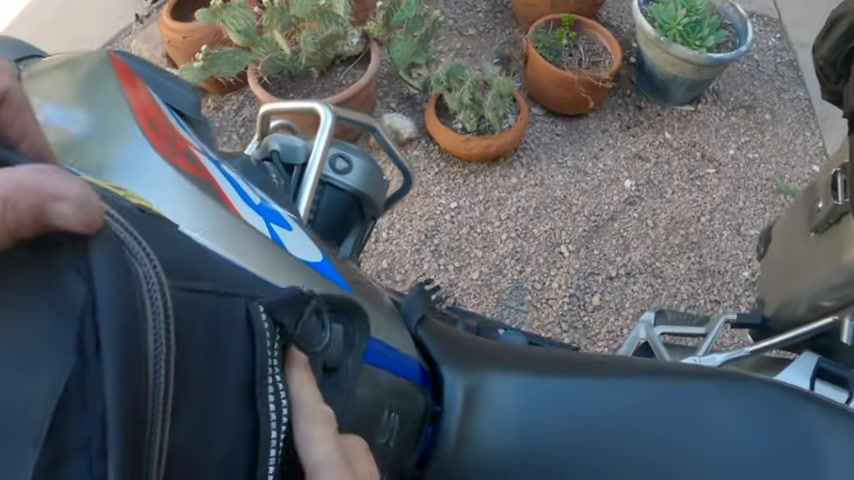
I definitely used a tank bag on this trip and I put the things that you would expect in there .
I also ended up using my tank bag a lot as my charging station .
And that's kind of a whole separate thing that I can get into in another video , how I charged my camera batteries and things like that on this trip .
So I want to tell you a little bit now about the camping and the cooking gear that I used in this video .
I brought my single person tent on a different trip .
I would probably bring my two person tent .
For example , if I thought the weather was going to be really bad and I would be spending a lot more time in my tent , I would definitely bring a two person tent because it's a little roomier and I could spread out some more of my gear .
But on a trip like this , in the summertime , hot weather , a single person tent for me , it was absolutely great .
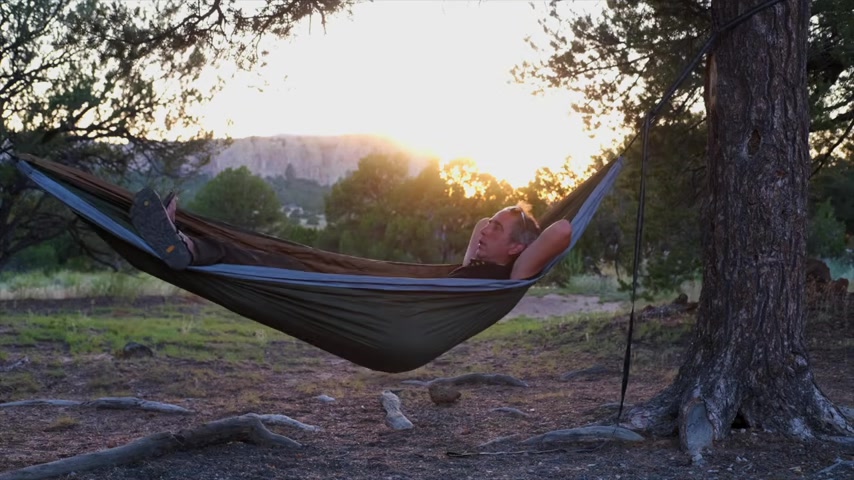
The rest of the time I slept in my hammock , which was a first for me , you know , I thought it was a lot more comfortable than I expected .
It would be , you know , I didn't make my back sore .
I was able to like move around in it and find good sleeping positions and I just really enjoyed it .
I liked being up off the ground , I liked the open air feeling of not being inside of a tent .
Maybe the only disadvantage I encountered was that when it was really cold up in some of the higher elevations , you know , you don't have any insulation on the bottom .
And so , unless you had a sleeping pad or something like that , it could get a little cold .
Now , as far as sleeping pads go , usually when I'm camping in a tent , I would bring a small inflatable air mattress and I started out on this trip with one of those , but I ended up sending it back along the way because I found I just wasn't really using it .
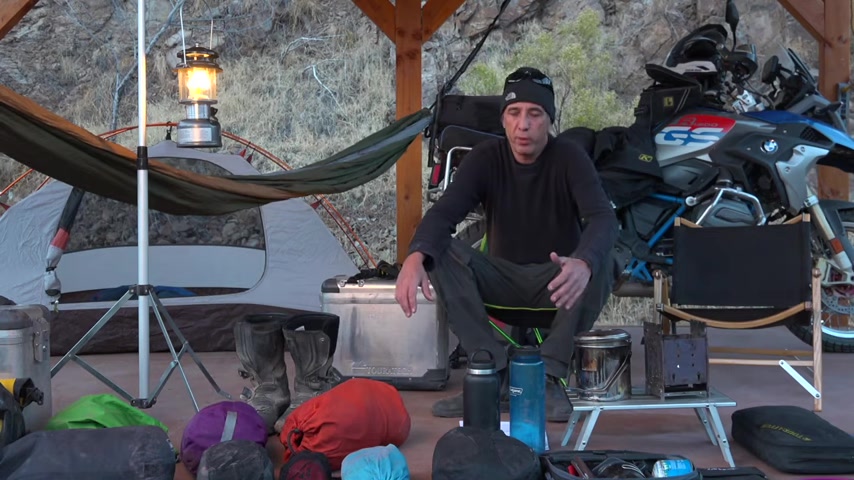
I was spending so much time in the Hammock and it was just taking up some extra space and I was trying to pare down a little bit .
So I sent it home that said I did end up sleeping in the tent quite a few nights on this trip .
And when I did sleep in the tent , I didn't have an air mattress .
So I basically just slept on the ground or I would lay my riding jacket out in my pants and some things to try to get a little cushioning , a little padding underneath me and I slept on that .
So it wasn't the most comfortable sleeping in the tent without an air mattress .
It's something that I really like sleeping on when I sleep in the tent .
But again , I sent it home so it wasn't the worst thing in the world , but that's what happened .
I brought a pretty warm sleeping bag on this trip and that's another thing that I have several of , I have three different sleeping bags for kind of like different temperature ratings .
But on this trip I knew I would get up in some high elevations and I expected that it might be kind of cold .
So I brought a much warmer sleeping bag .
It's a sleeping bag .

I think it's rated to about 15 degrees .
And I was really happy that I made that choice because it did get pretty cold and I was really comfortable in that bag .
And , you know , it takes up a little bit of space but not too much because it's down , it kind of packs up pretty good .
And I will say when it comes to packing my sleeping bag and my hammock and my tent , I just throw it all in my dry bags .
I don't try to stuff the sleeping bag and into a stuff sack or stuff the tent and do a stuffed sack and then put it in there .
I just put the sleeping bag right inside my dry bag and I just throw the tent right inside the dry bag and it just makes packing up a lot easier .
A lot of you asked if I brought two camping chairs on this trip , some of you might not have noticed but it's true .
I started out the trip with this chair .
It's called a Kermit chair .
They're kind of premium .

They're a little bit expensive , but they're really comfortable and they do disassemble and pack up small enough that you can carry them on a motorcycle .
I really like this chair a lot .
I'm definitely going to continue using it and I'm glad that I bought it , but that said I sent it home and I got this chair , the one that I'm sitting in now .
And the main reason that I did that is that even though it does pack up small and it goes into its own case , it doesn't fit inside of one of my pan .
And so I was having to attach it on the outside of one of my dry bags .
And I don't want to do that .
I just want my dry bags to be on the top with nothing else attached there and having to put the Kermit chair on there and then put the straps around .
The dry bag was just one thing that I didn't want to deal with .
So I ended up getting this chair here along the way .
And , you know , it's just a simple cheap camping chair .
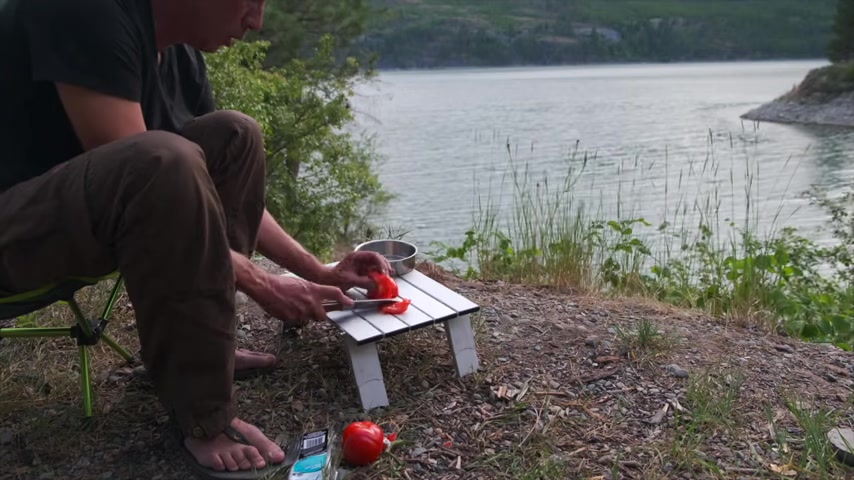
It's made by a company called Sportsman's Warehouse and they're like a big box camping store that I found it was only about $30 and it's super easy to use .
It's lightweight , it's comfortable .
I haven't had any problems with it .
And the best part is that I can pack it up and put it inside my pan here .
Another question I got is about my little folding table here .
I really like using this .
It was the first time that I used a little camping table like this .
It's a little more civilized and it keeps me off the ground and it keeps my things off the ground so everything stays a little bit cleaner and it just feels nice to be at a campsite in the back country and be able to sit down and comfort on a chair and also have a surface that's nice and flat .
A little bit elevated .
I can cook on it .
I can put the fire box stove right on the top here .
And so that works really nicely .
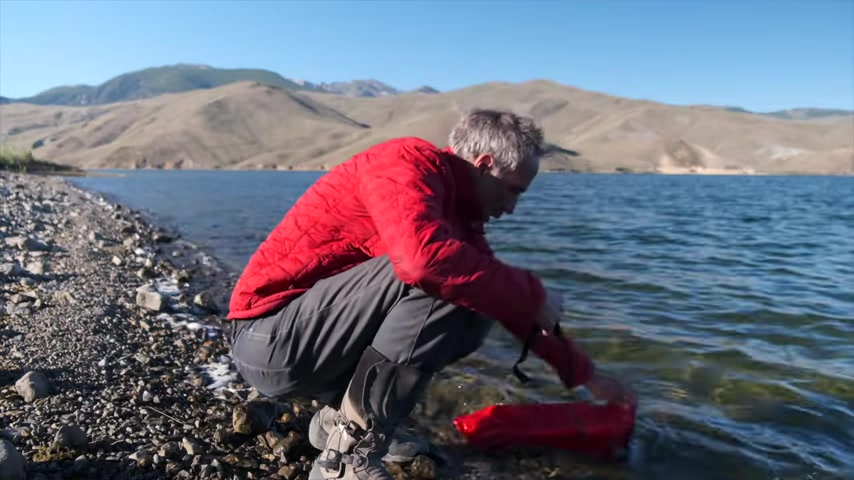
But I really enjoyed using this little table .
It's lightweight , it packs up really small .
And this table and this chair together have just about the same dimensions when they're packed up that they can fit right in the bottom of my small pan .
So this is an MS R water filter .
The way that it works is that you find a source of water and you fill up the bag and then gravity will let the water run through the tube , through the filter and into whatever container you want to put it in .
So you just hang it up on a tree or off of your motorcycle .
And you have basically like a little water fountain of your own with fresh pure water .
Keep that going .
So when it comes to cooking , cooking was a really fun part of this trip .
You know , I really planned to cook some good meals on this trip and I think I succeeded .
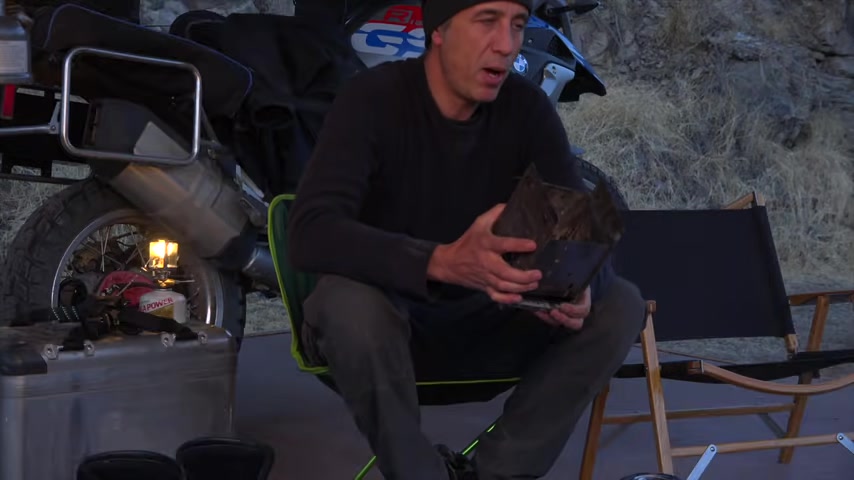
And , you know , the heart of the cooking for me was my fire box stove here .
And you've seen this in a lot of the videos .
It was the first time I used this product .
And no , I'm not sponsored by fire Box stove .
In fact , the reason that I use this stove is because I was watching their youtube channel .
Firebox stove and you should check it out .
The firebox stove .
Youtube channel is just awesome .
The guy that makes these stoves has dozens and dozens of videos where he goes into the back country on hikes and he fishes and he cooks amazing meals on this stove .
And what's really awesome about his channel as well is that hikes with his dogs and his goats ?
And it's just , it's hilarious and it's fun to see him romping through the wilderness with his goats and his dogs catching fish cooking on the firebox stove .
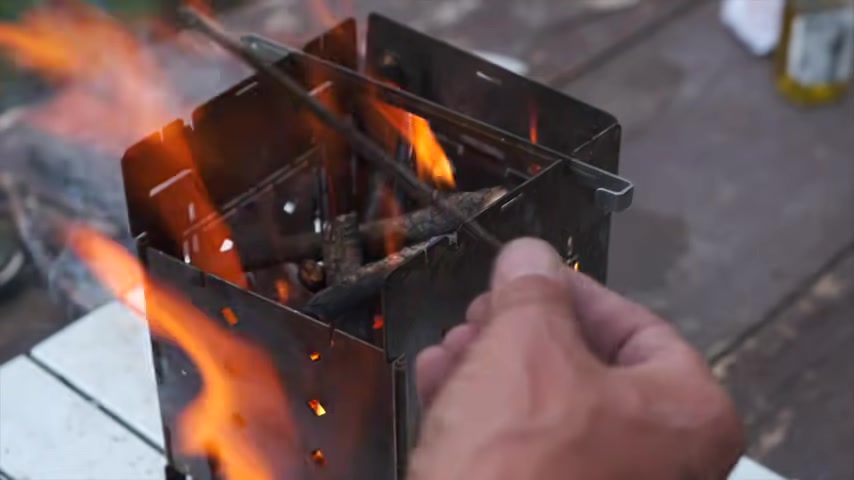
I mean , he's cooked like entire chickens and pot roast and he bakes breads and all kinds of amazing things .
You know , I'm just a beginner at this .
I cooked some pretty simple meals with it , but it worked really well .
I really enjoyed using it .
I'm definitely going to use it more in the future and it's just fun to use .
So it's pretty , you know , I don't want to go into it too much because I've covered it before , but it packs up pretty small .
It just folds flat like this .
You've got the ash tray that goes down here , it attaches and then it goes into its case right here .
It's a nice heavy duty cordo case , put it in there .
There's a couple of grill plates that go with it and some things like that , but they all fit together nicely .
It's heavy , it's solid , but it fits right in the bottom of the pan .
It's a great alternative to cooking on a gas stove .
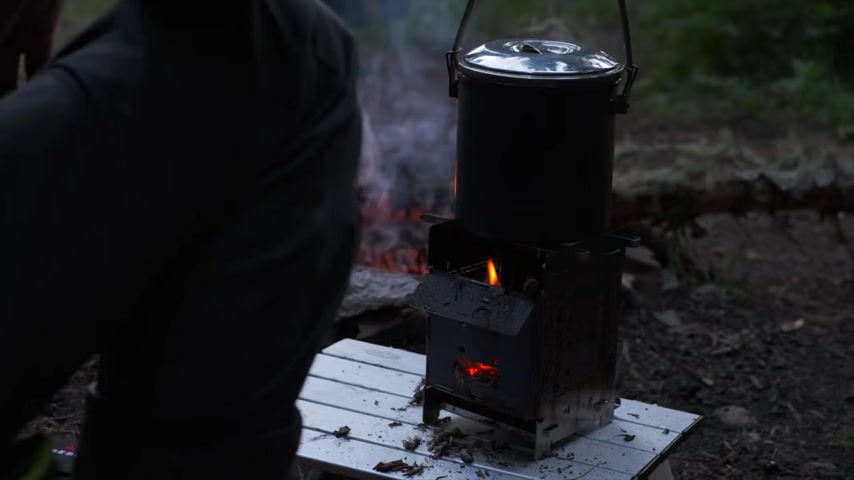
You know , one of the reasons that I liked using this fire box was I like campfires .
You know , to me , that's one of the most important elements of having a good camp experience is having a little fire .
It just , it gives the campsite some life , it gives it some ambiance , it provides some light .
And I just knew that that would be a big part of this trip .
The only disadvantage is that when you're traveling in the west in the summer time , there's a lot of burn bans and you can't always have a campfire , it's not allowed .
And so in that case , I would use a gas stove and I did bring a small gas stove on this trip .
It's really small .
It's an MS R brand stove and it's just this little stove and a fuel bottle here and it works great .
So now I'm going to go through my kitchen kit and it's all inside of this case .
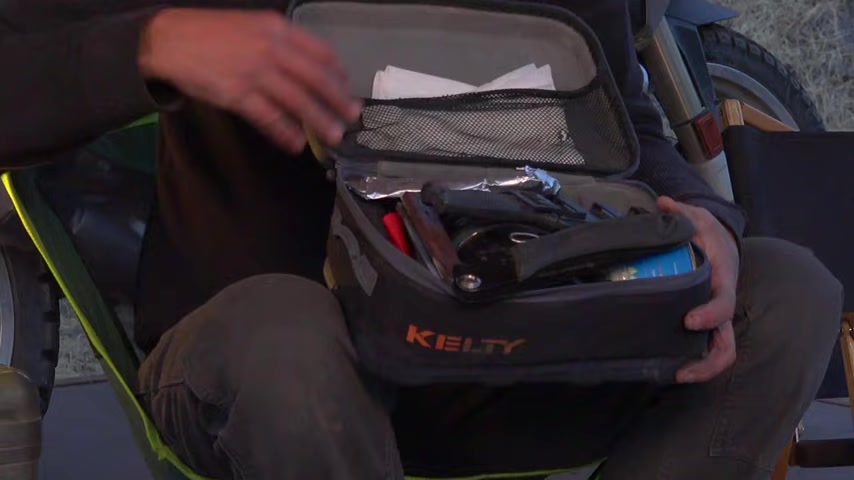
This is like a kelty brand protective case .
Basically , all of my kitchen stuff goes into this case and I'll kind of just quickly share with you what I've got here .
I always bring some paper towels with me .
I found that that's for me just the best way to clean out my camping gear after cooking a meal is nothing , works better than just wiping everything out with a paper towel and then I can burn it .
I don't have to take it out or anything like that with me .
I always have some tinfoil with me in case I need to wrap up something to cook some vegetables or something like that .
It's good to have the knife that I was using on this trip .
It's called a Gerber strong arm .
And it's basically just a really solid fixed blade knife .
I use it a lot for baton wood when I want to get some kindling , going to make a small fire .
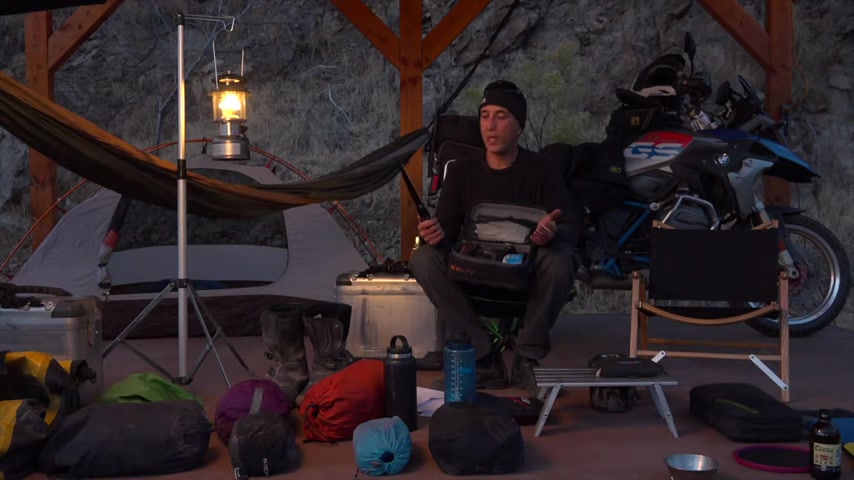
I also bring a folding saw and this is really good for cutting up firewood and it's sharp .
It works really well .
It's got a good grip to it and these serrated teeth are really sharp so it will cut through wood really quickly .
And even if you were to encounter a downed log across the road or a tree that was six or seven inches big .
You could cut through with this knife and clear a path .
One of the biggest questions I got was , what is your little folding knife that you use ?
And that's this knife it's made by a company called Herbert's .
I think they're from Germany and it's a rosewood folding chef knife and I'll put a link to it on my product page .
But basically , it's just like a little cute kitchen chef knife with a really nice , nice handle and it folds up .
It's got a little bit of heft to it and it's just kind of fun to use .
So definitely got a lot of questions about this knife .
You've seen me use this a number of times .
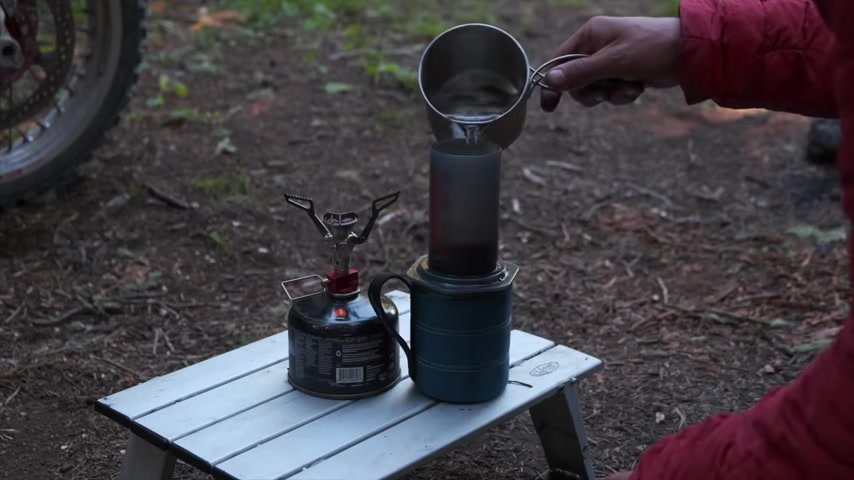
It's an aero press coffee maker .
It's not the smallest thing I've used other methods of making coffee that are perhaps smaller and lighter .
But for whatever reason , I just wanted to bring this one on this trip and , you know , it worked great .
Had to carry a few filters .
I've still got some left , but they go right inside there and then this is my coffee cup and my other metal mug .
And I like the fact that these kind of like nest together .
And so this cup is kind of insulated .
It's a plastic cup , but it's got this cover on it .
And if I take the cover out , you can see that it's just a basic plastic cup .
And what I also like is that it has these measurements on it .
So it will tell you how many cups or how many ounces of liquid are in there .
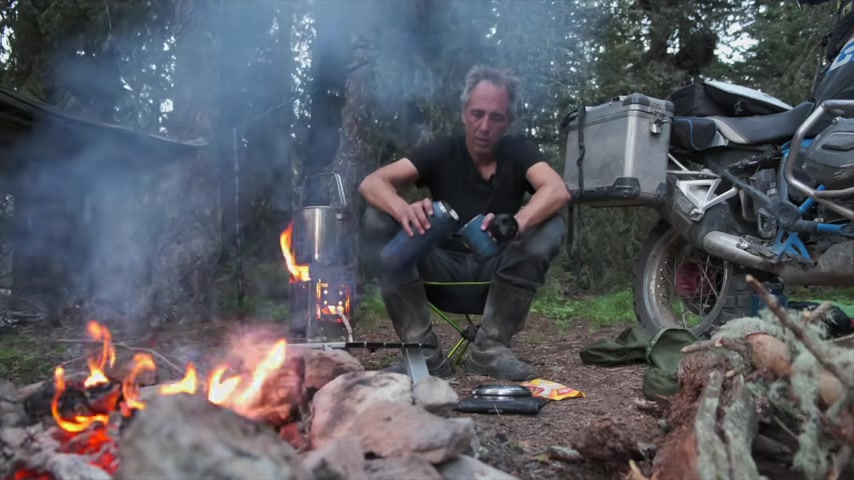
So if I'm cooking something in particular that requires that knowledge , I can use this cup , sometimes I'll put my beer in it in the evening so that I have this other cup available for cooking and this is a great cup .
It's just simple .
As you can see , it's all blackened and tarnished from cooking on the fire box .
But I use it to heat up soup or I use it to heat up water in the morning and then this one just goes inside of it and these fold down .
So super simple , super compact , a good pair of pot grabbers .
I got these from fire box as well .
I really like them .
They're probably the best pot grippers that I've ever used .
Super lightweight , really good gripping attachment there .
I did some research on the internet to find a pair of tongs and usually tongs are really long and kind of hard to pack .
And I wanted something that was really minimal , but that would just be good enough to grab a piece of meat on the grill and turn it over or something like that .
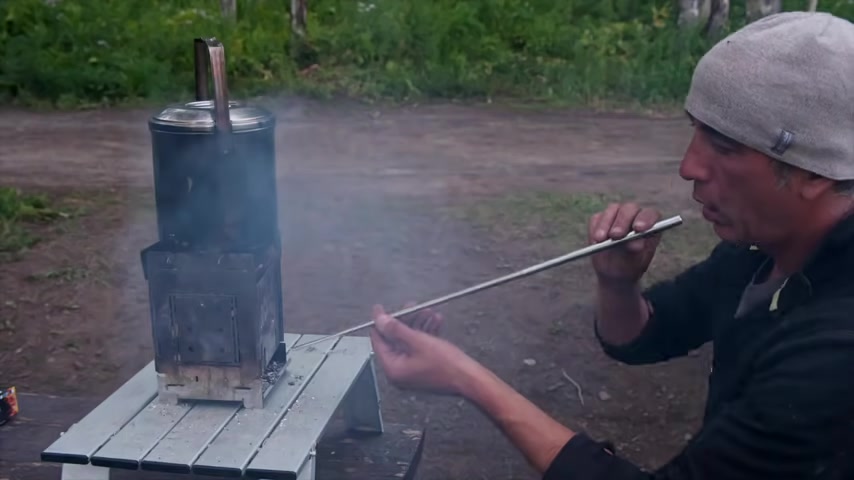
You know , when I'm dealing with hot things or if I wanted to move some coals around .
So I found these tongs , they're only about six or seven inches long .
They're nice .
They're very useful .
You can pull this handle and they stay closed and they fit right down inside here .
This is a little bellows and it's used to blow air into the fire box stove or if you were trying to start a fire and it really does funnel the air from your lungs and through your mouth down to here .
And you can really scope up a fire good with this .
And , you know , other times you might have to get really close and you get smoke in your , and you're trying to blow and then ashes and sparks hit you .
But you just spread it out , you blow on the fire , concentrates the air in the area that you need it .
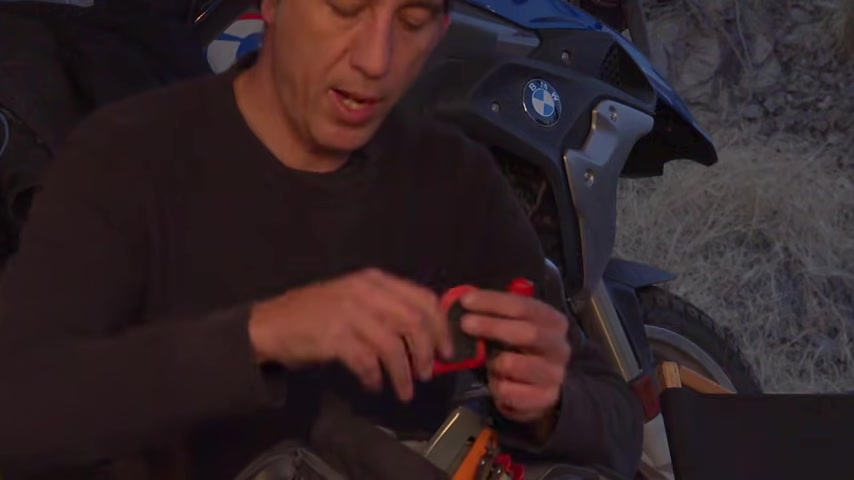
And it really helps you start fires and it works really good with the fire box because you can just put it in one of the little side holes and blow through it and it's really small .
It doesn't take up much space and it's just fun to use .
I love playing around with fire in the campsite .
What else do I have in here ?
This is just a little pot scrubber to clean out my pots .
And I've got some silverware that once upon a time , a long time ago , I actually hack saw it and filed the ends to make them a little bit shorter just so they would pack up easier .
But that's my little spoon .
And fork and knife .
When I started out my trip , I didn't have a plate to eat off of .
And so I picked this up along the way and it's made by Sea to Summit and it's a plate and a cutting board together .
So it works really good for cutting up vegetables or meat and things like that .
And then I have a plate to eat off of .
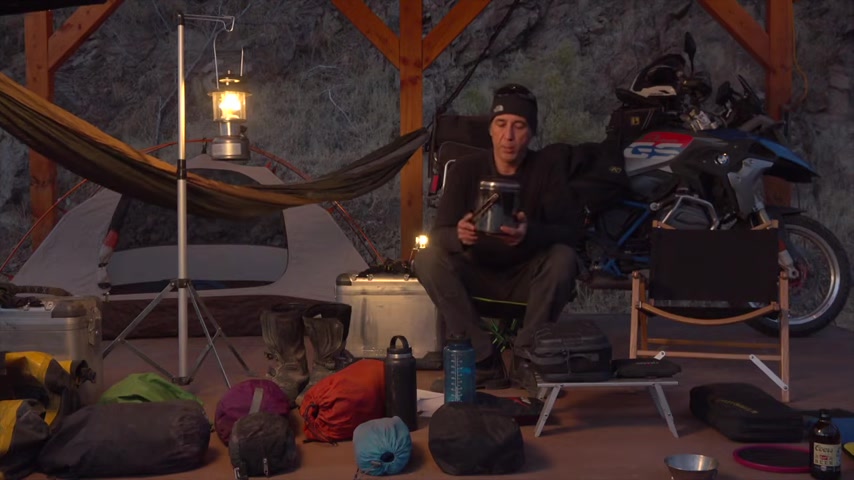
And it also has this lid that kind of pops up so you can put some liquids or soups or something in there like that .
So that was something I found really useful on this trip .
This is called a Billy Pot or a Billy Can .
And the brand is zebra I think is the name , I think it's a company out of Thailand .
I got this also from Player Box stove and it's the 14 centimeter version , the 14 size if you're looking to know what size it is , but it's basically a stainless steel cooking pot with a handle that comes up and then it has these little clips on the side and when you activate those , the handle stays up .
And the reason for that is that it stays cool , it doesn't get hot from the fire that you're cooking on .
So even if it's sitting on the stove , boiling water , you can just grab the handle like that .
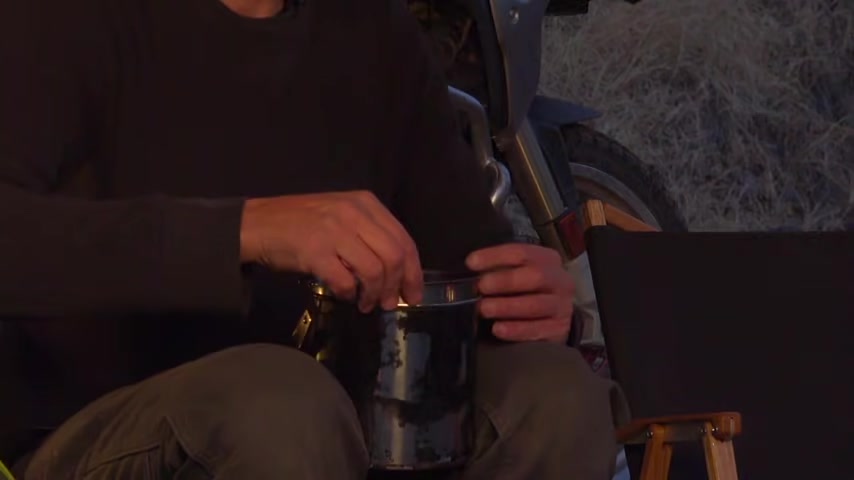
And then it has this little pot that goes in the top which is like a little frying pan basically .
And then , you know , then it's just a pot .
And inside here , I've got some coffee , I've got some fire starter and a pair of leather gloves .
And I find these really useful in dealing with fire .
So when it comes to dealing with food and having the right things to cook on a trip like this , you have to be prepared and you have to get what you need before you get out there , basically .
And so I would try to stop at the store four or five o'clock in the afternoon and pick up supplies for the night so that I could cook a really good meal and get whatever I wanted to have for breakfast the next morning .
And I would also try to fill up my water jug so that I had water for the whole night .
And if I was in the mood , I would stop at a store and I fill this hydro flask up with beer .
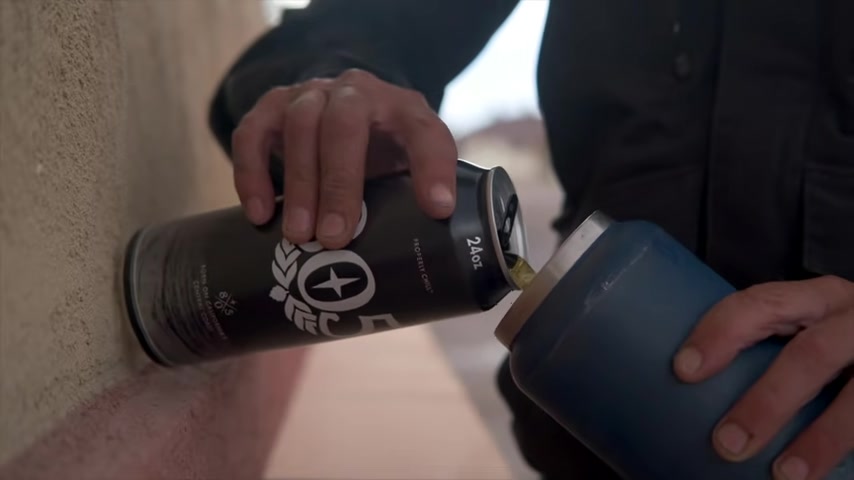
And so by putting it in this flask , it would keep it as cold as it came out of the refrigerator .
The other reason I do that is because if I fill this up at the gas station with the beer , then I can throw away the empty containers and the trash at the gas station .
And I don't have to deal with bringing out empty cans or bottles with me from the woods .
The only thing I would say is try to get one that's the size that you want .
And so for example , if you know that you're going to want to drink two beers at the end of the day and those are 12 ounce beers , try to find a 24 ounce Hydro flask because I think you want to try to fill it up as much as you can so that there's less air , less space .
And that way as you're riding and it's bouncing , it's not going to ferment and build up as much pressure inside .
Because when you do go to open it , you got to open it really slowly because it's going to start to hiss and bubbles and foam are going to come out .
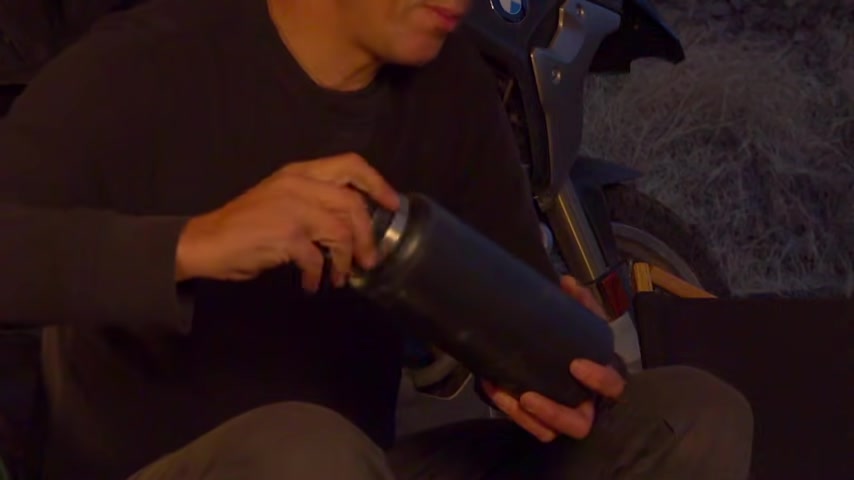
And if you just crack it and let that air come out of it really slowly , then you can open it up and pour out your cold beer and you don't have any empties on this trip .
I had my camel back which has , you know , that's probably a liter and a half that it can hold inside there .
And then I would carry water .
And this and I also use this backpack to store some snacks for the day , like some power bars or things like that .
And then this is also my grocery bag in the evening .
So at the end of the day when I want to go in and get my supplies , I just throw my groceries for the night right in here and I don't have to fuss around with trying to find space in my panniers or attach a grocery bag to something .
I just put it right in here .
Get to the campsite .
My food is in here .
Then I put the trash right back in here and I can empty it out .
When I get to the gas station in the mornings .
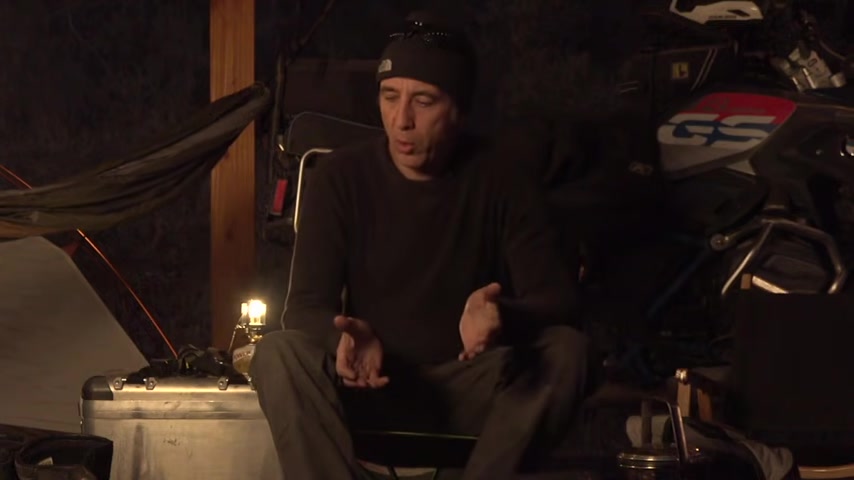
The only food or things that I would carry with me ongoing on a regular basis that I always wanted to have would be olive oil , salt and pepper , and coffee .
There are so many things that you can cook if you just have a little bit of olive oil and salt and pepper .
And of course , I just always like to have my coffee in the mornings .
All right , let's talk about clothing .
It's pretty simple and I know I already covered it in the video where I showed you how I do my laundry .
But my theory for this trip was that basically , I would bring three pairs of the basics .
So like three T shirts , three socks and three underwear .
And I chose three for a very specific reason .
And that reason is that I would wear each of those for two days , which would give me a total of six days worth of clean clothing .
And then on the seventh day , I would do laundry .
So that's my clothing bag .
It's not very big .
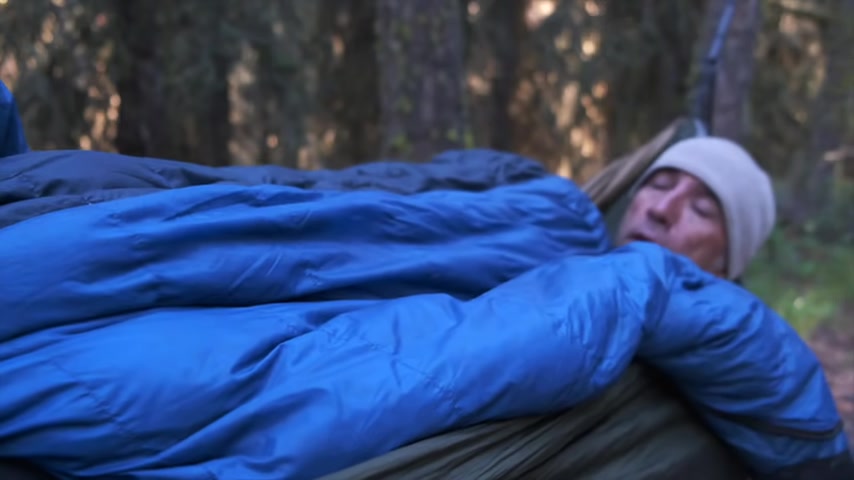
And then this is another clothing bag and this is more like my warm weather .
Campsite gear .
And what's cool about this system is that when I get to the campsite , I pull out my long underwear and I put that on for those cold nights around the campsite .
And if it's really cold , I have a little down jacket that I could also put on and a beanie because it's really important when you're sleeping in a sleeping bag , your whole body is warm , but you can lose a lot of heat through your head .
And so having a little cap like this makes those nights a lot better .
And I also carry a pair of swimming trunks in this bag .
But in general , when I'm sleeping at night , I might be wearing the long underwear and the beanie and then I'll just leave the rest of this in this bag and it becomes my pillow .
So that's really nice .
And what I like about this bag is that you can turn it inside out and it has fleece .
So it's really comfortable .
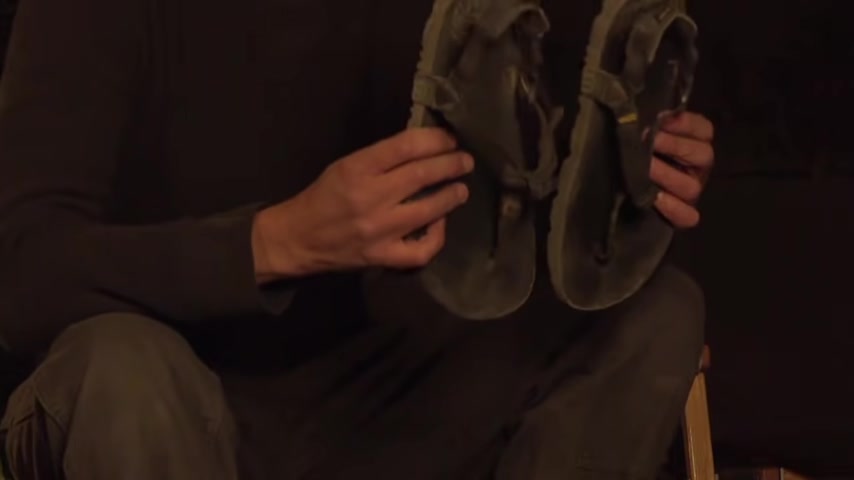
So these are my camp sandals and they're made by a company called Luna and it's a friend of mine .
His name is barefoot Ted that started this company .
It's really important to have a pair of footwear besides your motorcycle boots .
So that when you get to your campsite at the end of the night , you can take off your boots and have something else to wear .
And these work really well in the summer time when it's nice and warm and hot out .
I wouldn't necessarily use them if I was going to be in a wet , muddy , cold weather environment .
But in the summer time they work great and they're super minimal .
They just pack up really small .
So I just put them in one of my dry bags .
They're very light weight .
This is my bathroom bag .
Not much to say here , it's just pretty much what you would expect .
I keep a roll of toilet in here , toothpaste , toothbrush shaving cream , some ibuprofen , that kind of stuff .
I always keep my head lamp in here too for some reason .
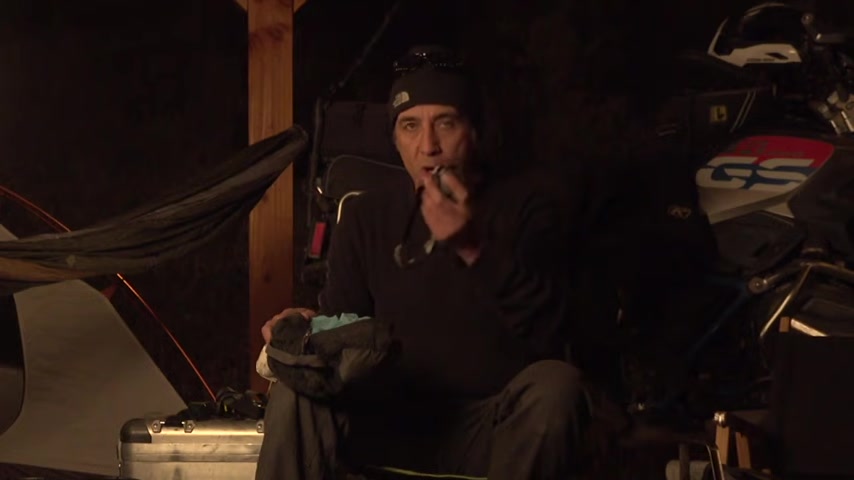
It just that way I know where it is and I don't usually need it until night time when I'm off the bike and I'm unpacking my things and then I know my head lamp is inside my bathroom bag right here .
This is where I keep all of my motorcycle tools and I chose to put them all in this bag so that they're all in one place and this bag fits right in the bottom of my pannier .
So tools are generally one of the heavier things you're going to carry .
So you want them to be low center of gravity on your bike on the inside .
Here , I've got a tool roll .
This is the cruise tools set .
It's from tour and it's designed for my motorcycle .
So that's my basic tools and then I supplement it here with a tire patch kit and of course , the 1200 G S has the tubeless tires , but you've got to have the right tools that you need if you're going to fix the tubeless tire .
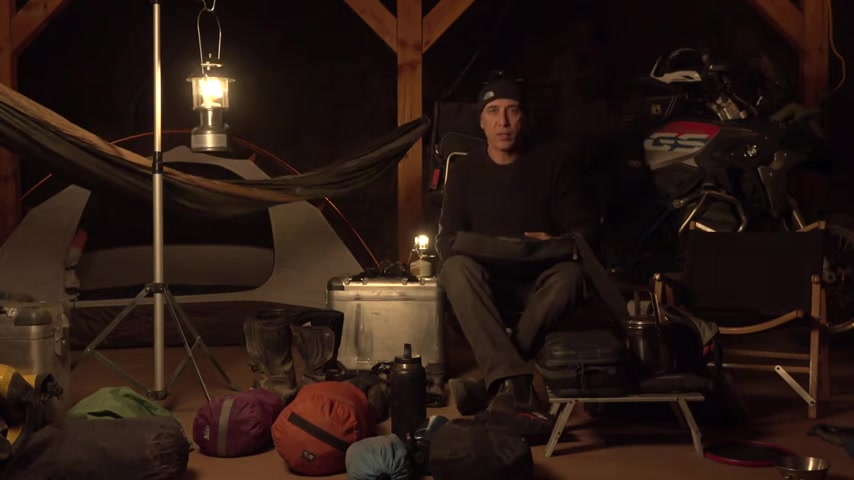
So I've got , you know , all that kind of stuff in this little little pouch right here .
And then the other important aspect would be an air compressor .
And so that's what this little case is here .
This is a slime brand , there's lots of them out there .
You know , this isn't the best or the smallest , but it's what I have .
It works .
It's an air compressor and it's super important to be able to change a tire to fix a flat tire .
Because if you get out 100 miles in the back country and you're all by yourself and you get a flat tire , you need to be able to fix it .
And then in this little case , I've just got some extra things that I would recommend bringing some duct tape , zip ties , got some lock tight right here , some JB Weld and a BMW strap .
And these things are like gold .
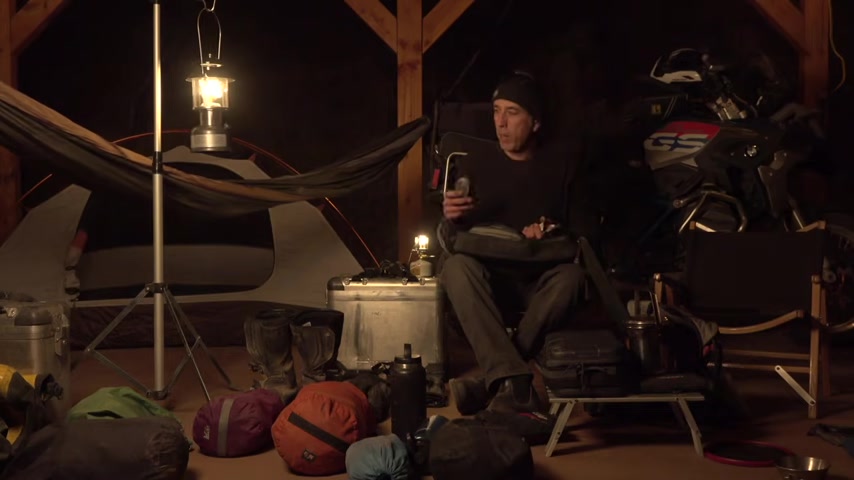
You can go to your BMW dealership and pick them up usually for a dollar or two , what they use to strap the bikes when they come on a shipping container and they bring them in and then they have all these straps left over .
And every time I go to a dealership I buy whatever ones they have because I just find them so useful .
I use them around the house .
I use them on my van and I always carry one of them with me because I've just used them innumerable times for different reasons .
On this trip , one of my pannier lids broke and it would , you know , rattle or it could fly up and down .
So I actually used the strap to put around the pan and to hold it in place until I was able to get back home and repair that I really like this system .
The only thing that I found that I don't like is on those occasions when I want to go for a ride without my panniers .
Let's say I'm just going out for a day ride and I don't need panniers because I'm not bringing a bunch of camping gear with me .
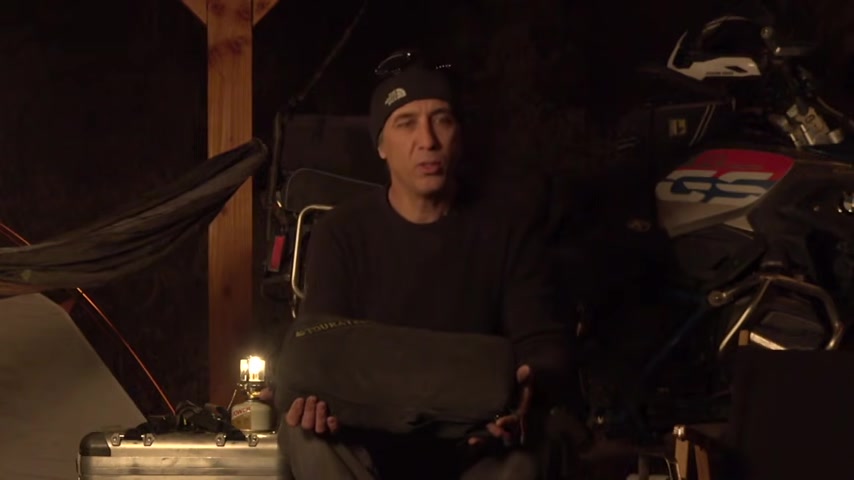
But I still want to carry my tools and my compressor because I could still get a flat tire .
And so then , you know , I have to bring this with me and if I don't have panniers , it's not the easiest thing in the world to attach to my bike .
However , I have a new solution for that .
Thanks to Outback Moto .
They recently sent me a toolbox that mounts on the inside of my pannier rack so I can put some of my tools in there and they stay in there and it's lockable .
And then when I remove my pan , I still have tools inside of that little tool box .
So that just about wraps up this little video of answering your questions and telling you about some of the gear that I used on this riding solo project .
And I hope that helps .
I hope that , that you've learned a few things in this video and that it helps consolidating it all into one video .
So if you have any other questions about this kind of stuff , feel free to drop me a comment and let me know .
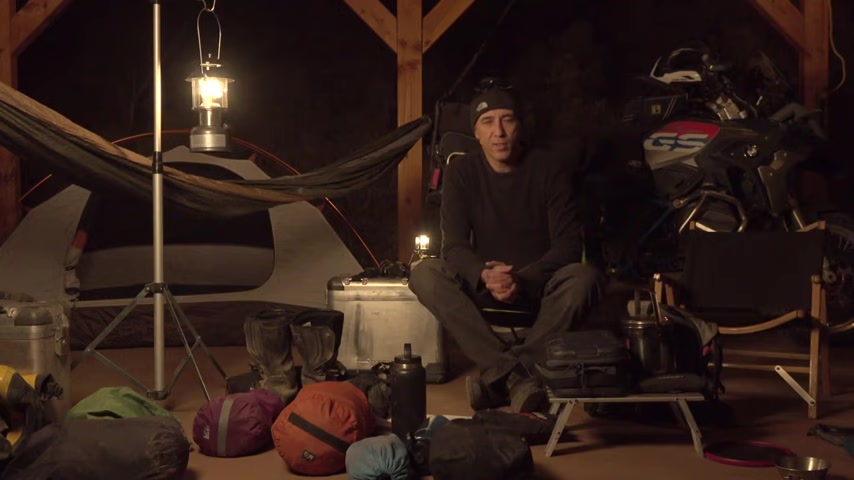
Or if you have any other thoughts and suggestions about this channel or what you'd like to see , feel free to let me know it's getting cold out .
It's kinda getting late at night here and I'm going to turn off the lanterns and go inside and warm up and say goodbye for now and we'll catch you up in the next video .
Are you looking for a way to reach a wider audience and get more views on your videos?
Our innovative video to text transcribing service can help you do just that.
We provide accurate transcriptions of your videos along with visual content that will help you attract new viewers and keep them engaged. Plus, our data analytics and ad campaign tools can help you monetize your content and maximize your revenue.
Let's partner up and take your video content to the next level!
Contact us today to learn more.